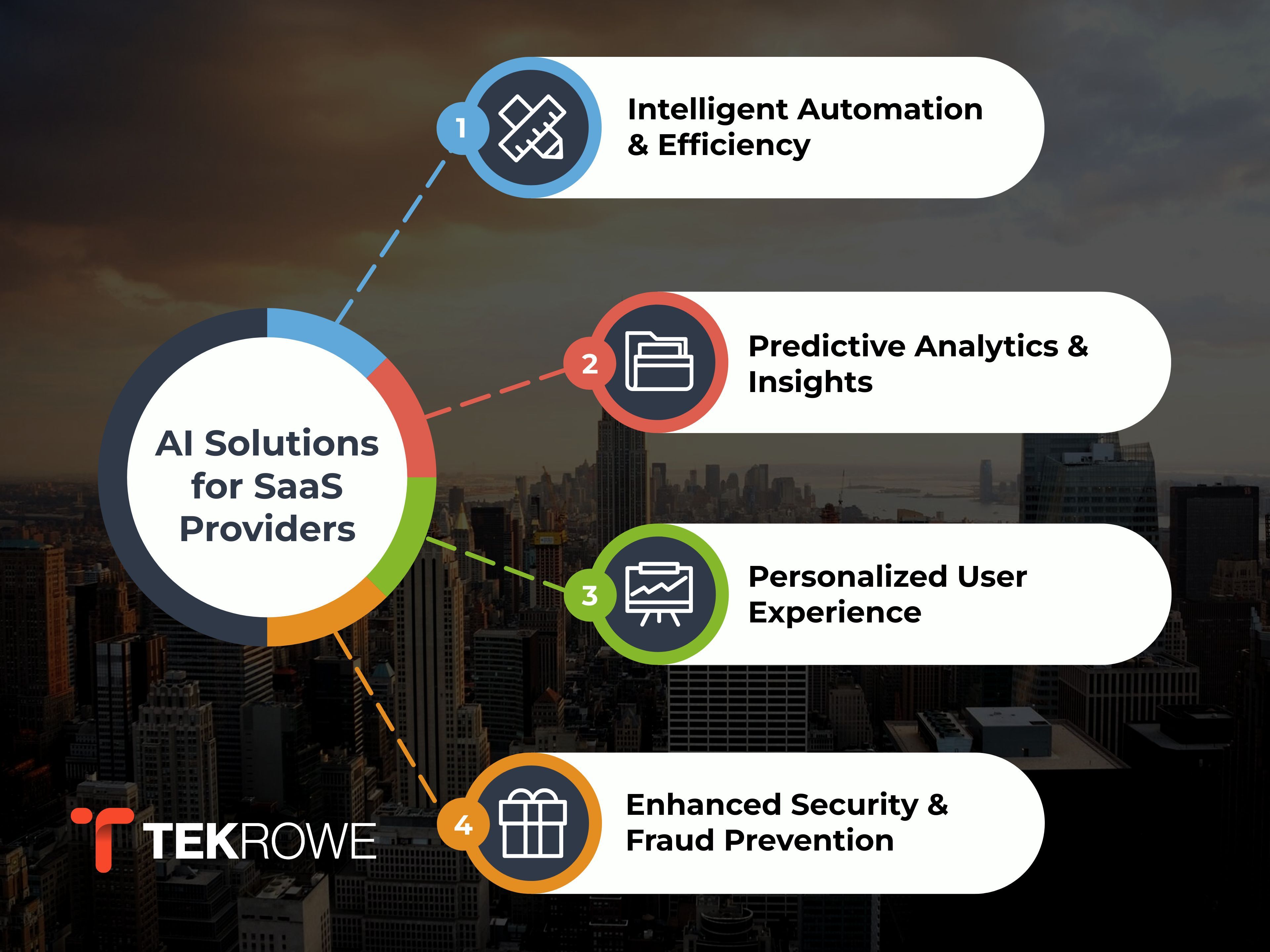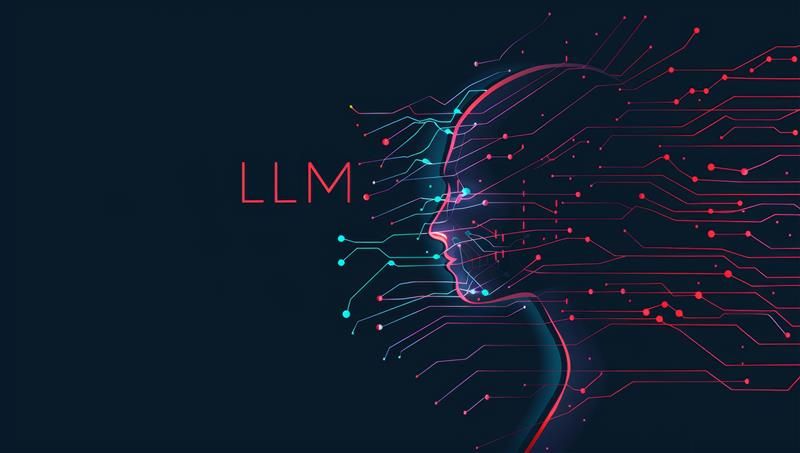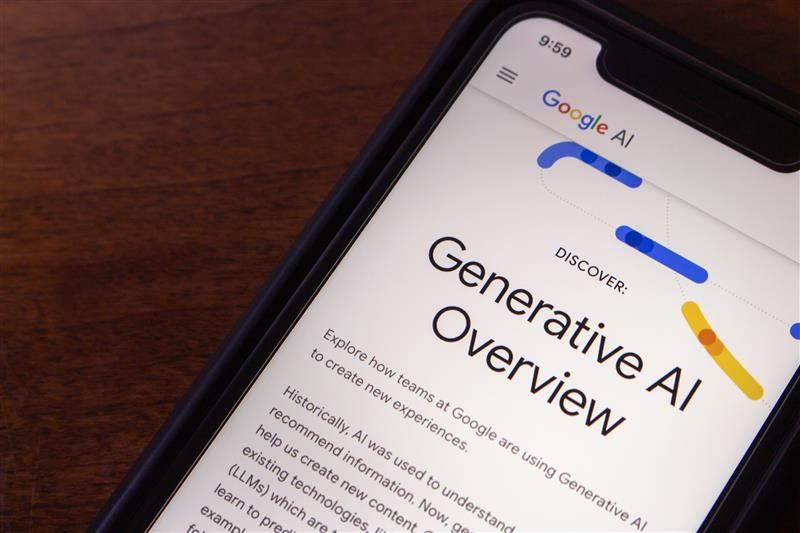SaaS (Software as a Service) is a game-changer in today’s digital landscape. By delivering software over the cloud, it allows businesses to scale seamlessly, reduce costs, and focus on growth. But here’s the twist: when you sprinkle Artificial Intelligence (AI) into the mix, SaaS platforms become unstoppable forces of efficiency and innovation.
Did you know that businesses leveraging AI are 40% more productive than those that don’t? Or that AI in the SaaS industry is expected to grow at a staggering 20% CAGR by 2030? These numbers underline the transformative potential of AI solutions for SaaS providers.
In this article, we’ll explore the why, how, and what of AI in SaaS. From its benefits and use cases to challenges and future trends, we’ll leave no stone unturned. So, grab a cup of coffee, and let's dive deep into the world of AI-driven SaaS innovation.
Understanding AI in SaaS
What is Artificial Intelligence in SaaS?
AI in SaaS refers to the integration of machine learning, natural language processing (NLP), and predictive analytics into SaaS platforms. Essentially, it’s like upgrading a bicycle into a self-driving car—it amplifies speed, efficiency, and intelligence.
Imagine SaaS tools that can predict customer churn, recommend actionable insights, and even automate routine workflows. That’s the power of artificial intelligence SaaS in action. These capabilities allow SaaS platforms to learn and adapt, ultimately providing an even better user experience, continuously evolving to meet user needs.
Key Components of AI for SaaS Providers
- Machine Learning (ML): Enables software to learn from user interactions and improve with time without manual reprogramming.
- Natural Language Processing (NLP): Powers smart chatbots, customer support agents, and voice command functionalities, enabling seamless human-machine interactions.
- Predictive Analytics: Provides data-driven forecasts to help businesses make strategic decisions. This is especially useful for sales forecasting, customer engagement, and identifying churn risks.
- Computer Vision: Useful for platforms handling images or videos, such as in e-commerce or media. Computer vision helps in analyzing visual content, tagging, and making the data useful for end-users.
- Robotic Process Automation (RPA): AI can handle repetitive tasks like data extraction and form filling, ensuring processes run smoothly without human intervention.
Benefits of AI Solutions for SaaS Providers
Enhancing Operational Efficiency
AI removes the bottlenecks caused by repetitive tasks, allowing SaaS providers to focus on growth and innovation. Instead of manually handling routine jobs, AI takes over, enabling human teams to channel their energy into more meaningful work.
Automating Repetitive Tasks
Tasks like data entry, report generation, and system monitoring can be automated, saving countless hours. Imagine an AI assistant that works tirelessly in the background—whether it’s preparing financial reports or logging customer data, AI makes these tasks a breeze.
Streamlining Customer Support
AI chatbots handle customer queries instantly, offering 24/7 support without adding to overhead costs. By using NLP, these bots understand customer questions better and respond in a more conversational way. Additionally, chatbots can escalate more complex queries to human agents, thus reducing their workload and providing a more efficient support system.
Driving Product Innovation
AI transforms static platforms into dynamic tools that adapt to user needs in real-time. SaaS providers can identify opportunities to improve or create new products based on user behavior data, which AI collects and processes in the background.
Personalized User Experiences
Through AI, SaaS platforms can analyze user behavior and tailor experiences in real-time. Ever wondered why Netflix seems to know exactly what you want to watch next? That’s SaaS artificial intelligence at work. AI creates personalized dashboards, content recommendations, and even product tutorials, enhancing user satisfaction and engagement.
Advanced Data Analytics and Insights
AI dives deep into data lakes, extracting actionable insights that were previously impossible to uncover. The amount of data generated by SaaS applications can be overwhelming, but AI can sift through it all to find trends, correlations, and patterns that can inform decision-making. This can be vital in understanding what features users love and where there is room for improvement.
Enhanced Customer Engagement
AI-driven SaaS platforms can analyze user interactions to identify opportunities for better engagement. Whether it's offering personalized discounts, timely in-app messages, or providing smart onboarding, AI helps keep customers interested and happy.
Top AI Solutions for SaaS Providers
AI-Powered CRM Systems
Customer relationship management (CRM) systems are now evolving with AI. CRMs like Salesforce and HubSpot use AI to optimize lead tracking, customer segmentation, and sales forecasting. This allows sales teams to focus on high-priority leads while AI takes care of time-consuming administrative tasks.
AI in Customer Support Platforms
Customer support is an integral part of any SaaS product, and platforms such as Zendesk leverage NLP to provide instant and accurate resolutions to customer queries. AI-driven customer support platforms also use ML to learn from previous interactions, constantly improving the quality of support.
AI-Enhanced Marketing Tools
Marketing is crucial to the growth of any SaaS platform, and AI has changed the game completely. Marketing automation platforms like HubSpot use AI to create personalized campaigns, measure engagement, and optimize content for better reach. It’s all about getting the right message to the right person at the right time.
AI SaaS Platforms in HR Management
Platforms like Workday use AI to match talent with opportunities and predict workforce trends. These solutions use predictive analytics to gauge employee satisfaction, identify potential churn risks, and recommend career development paths for individuals. HR teams can focus on the human aspect while AI crunches the data to make sense of employee behavior.
AI-Powered Product Recommendation Engines
For SaaS platforms dealing with a marketplace or e-commerce, AI-powered recommendation engines are indispensable. Amazon and Spotify are perfect examples. AI analyzes customer preferences and behaviors to recommend products or content, thus boosting sales and increasing user stickiness.
Use Cases of AI in SaaS

Predictive Analytics for User Retention
AI can spot the early signs of user churn, enabling providers to take proactive measures. By analyzing usage patterns and customer behavior, AI can identify users who may be at risk of unsubscribing. Armed with this insight, businesses can send personalized offers or reminders, ultimately improving retention rates.
Intelligent Pricing Models
Dynamic pricing algorithms powered by AI analyze market conditions, competitor pricing, and user behavior to set optimal prices. This ensures that the pricing strategy is always data-driven and up-to-date with market trends. SaaS providers like Airbnb utilize AI to adjust their prices in real-time, ensuring competitiveness while maximizing revenue.
Real-Time Fraud Detection
AI has advanced capabilities in detecting anomalies in data, which makes it a great fit for fraud detection. With AI, SaaS providers can monitor transactions and flag unusual activities, ensuring secure operations and minimizing fraud risks. Payment gateways and e-commerce SaaS platforms, such as Stripe, leverage AI to detect potentially fraudulent transactions.
AI-Powered Content Recommendations
Platforms like Spotify and YouTube use AI to suggest personalized content, keeping users engaged longer. Content-based SaaS platforms benefit immensely from AI’s ability to sift through mountains of data, learning what users like and delivering it to them at just the right moment.
Workflow Optimization
AI platforms like Monday.com automate project management tasks, ensuring deadlines are met and resources are used efficiently. For instance, AI can prioritize tasks based on urgency or dependencies, making project management more efficient and ensuring no critical tasks fall through the cracks.
Sales Forecasting and Lead Scoring
AI can provide insights into sales forecasting and help prioritize leads based on their likelihood to convert. This is especially beneficial for SaaS companies that have a long sales cycle. Platforms like Pipedrive use AI to score leads, making sales teams more efficient by focusing on the most promising prospects.
Chatbots for Customer Interaction
AI chatbots have become indispensable for SaaS platforms. Not only can they handle basic customer inquiries, but AI also allows chatbots to learn from user interactions, providing more insightful and relevant answers. This reduces the pressure on human agents and ensures customers get immediate responses.
Behavioral Analysis for Feature Improvements
Understanding which features users engage with helps SaaS providers focus on what works and iterate on what doesn’t. AI analyzes behavioral data to identify popular features and those that need improvement. Product teams can then make data-driven decisions to improve the user experience.
Challenges in Implementing AI for SaaS Providers
Data Privacy and Security Concerns
AI thrives on data, but ensuring compliance with regulations like GDPR and CCPA is a significant challenge. With data privacy becoming a hot-button issue globally, SaaS providers need to ensure they’re handling user data responsibly. AI models require extensive data to function well, and balancing between functionality and compliance is crucial.
Integration Complexity
Merging AI tools with existing SaaS systems requires expertise, planning, and often, additional investment. Integrating AI without causing disruptions or downtimes can be challenging, particularly for smaller SaaS companies that may lack in-house technical expertise.
Cost of AI Implementation
Although AI delivers long-term ROI, the upfront costs for development, integration, and maintenance can deter smaller SaaS providers. Building custom AI solutions can be costly, and the complexity of deployment might require specialized talent, which further adds to expenses.
Managing User Expectations
AI in SaaS is often portrayed as almost magical. However, over-promising AI capabilities can lead to disillusionment if the technology doesn’t meet user expectations. It’s important for SaaS providers to manage expectations and communicate clearly what AI can realistically achieve in their applications.
Data Quality and Availability
For AI models to work effectively, they need clean, quality data. Inadequate data quality can significantly impact the performance of AI. SaaS companies need to ensure they have processes in place to gather and clean their data before using it in AI models.
Top AI SaaS Companies to Watch
Overview of Leading Players
- Salesforce Einstein: Revolutionizing CRM with predictive analytics that suggest next steps for sales teams based on historical data.
- Adobe Sensei: Empowering creative professionals with AI-driven insights that accelerate design and content creation processes.
- Google Cloud AI: Offering scalable, developer-friendly AI tools that are easy to integrate into existing SaaS solutions.
- Microsoft Azure AI: Providing a comprehensive suite of AI services, including vision, speech, and decision-making tools for SaaS developers.
- Zoho Zia: A conversational AI platform that assists in optimizing productivity and providing intelligent business insights.
Features of Top AI SaaS Platforms
These platforms offer advanced features such as automation, personalization, predictive modeling, and user-friendly dashboards to make AI accessible to non-technical users. Many also feature low-code or no-code AI, making it possible for even smaller SaaS companies to start leveraging the benefits of AI without needing specialized skills.
The Rise of AI SaaS in SMB Markets
Companies like Freshworks are also making strides in bringing AI to the small and medium-sized business (SMB) market. Freshworks provides AI-driven customer support solutions that help small businesses deliver an experience similar to larger competitors. This democratization of AI tools means companies of all sizes can harness the power of artificial intelligence without breaking the bank.
Need Help with Your Business
Contact Us NowHow to Choose the Right AI Solution for Your SaaS Business
Assessing Business Needs
Start by identifying pain points: Are you losing customers? Struggling with manual tasks? AI can address these issues. Knowing the areas of your business that need a boost helps in selecting the right AI tools that can make an immediate impact.
Evaluating Scalability and Flexibility
Your chosen AI tool should grow with your business and adapt to evolving requirements. SaaS is all about scalability, and your AI solution should be no different. Ensure that the AI solution can handle growing data volumes and expanding user bases without diminishing in performance.
Integration Capabilities
Choose AI solutions that integrate seamlessly with your existing tech stack. The ability of the AI solution to work well with your existing infrastructure—whether it’s your CRM, ERP, or customer support system—is crucial to successful implementation.
Budget Considerations
Compare costs against expected ROI. Many AI SaaS products now offer scalable pricing for small and medium-sized businesses. It’s important to understand not just the upfront costs but also ongoing costs related to maintenance, upgrades, and additional data processing requirements.
Vendor Expertise and Support
AI can be complex, and having a vendor who provides robust support, training, and consultancy can make a big difference. Make sure that the vendor you select has the experience, technical skills, and the willingness to help your team make the most of AI.
Future Trends in AI for SaaS
AI in Low-Code Development Platforms
These platforms are democratizing software creation, allowing even non-developers to build applications without coding knowledge. AI adds further value by optimizing workflows, improving app functionalities, and making them user-friendly.
Enhanced AI-Driven Personalization
Future SaaS platforms will predict what users need before they even realize it themselves. AI will soon allow SaaS products to understand user intentions, preferences, and needs better, providing a highly personalized experience that feels almost intuitive.
Predictive AI Models for Market Trends
Imagine knowing industry shifts before they happen. AI will make this a reality, helping SaaS providers stay ahead of the competition. By analyzing historical data and current trends, AI can provide forecasts that allow companies to pivot or invest in emerging opportunities.
Voice-Activated SaaS Tools
With advancements in NLP, SaaS platforms may soon integrate voice commands for hands-free operation. Imagine interacting with your SaaS dashboard just by talking to it, similar to Siri or Alexa—that’s the direction the industry is heading.
AI-Powered Collaboration Tools
Tools like Slack are already incorporating AI to streamline workflows and improve team communication. Future AI collaboration tools will help detect workflow bottlenecks, assign tasks automatically, and even remind teams of pending deadlines—taking productivity to the next level.
AI and Robotic Process Automation (RPA) for Hyperautomation
The concept of hyperautomation—using AI and RPA to automate as many processes as possible—is gaining traction. SaaS providers are starting to embed RPA within their solutions, allowing users to automate end-to-end workflows, from customer onboarding to billing and beyond.
The Role of AI in Cybersecurity for SaaS
Cybersecurity threats are evolving, and AI is becoming a necessity for SaaS providers to protect customer data. Future SaaS platforms will incorporate AI not only for real-time threat detection but also for preemptively identifying vulnerabilities in the system before they become issues.
AI-Enabled Analytics Dashboards
The future of analytics dashboards is shifting towards more intelligent, AI-driven interfaces. AI dashboards will automatically detect and notify you of anomalies, trends, and opportunities within your business’s data. This kind of proactive alerting will reduce the need for manual data sifting.
Explainable AI in SaaS
Explainable AI is all about making sure that the decisions made by AI models are understandable to humans. SaaS providers are increasingly focusing on transparency in AI to build trust. If a model recommends a decision, users will be able to see exactly why that recommendation was made, allowing for greater accountability.
Conclusion
AI is not just a trend; it’s the new standard for innovation in the SaaS industry. From automation to personalization, the potential benefits are too significant to ignore. For SaaS providers, adopting AI isn’t just about keeping up—it’s about leading the charge into the future. The companies that embrace AI solutions early will be the ones shaping the landscape, enhancing operational efficiency, and delivering groundbreaking customer experiences.
Whether you’re aiming to streamline operations, provide personalized user experiences, or drive innovation in product offerings, AI solutions for SaaS providers are the ultimate game-changer. The future is AI-driven—make sure your SaaS business is part of it.
FAQs
How does AI improve SaaS customer experiences?
AI enhances customer experiences by offering personalized interactions, automating responses, and delivering tailored recommendations. AI chatbots and recommendation engines provide instant, relevant help, making the user journey smoother.
What are some common AI tools for SaaS providers?
Popular tools include Salesforce Einstein for CRM, Zendesk AI for customer support, HubSpot for marketing automation, and Google Cloud AI for general machine learning and predictive analytics. These tools help in automating processes and providing actionable insights.
Are AI SaaS platforms affordable for small businesses?
Yes! Many platforms now offer tiered pricing models, ensuring affordability for businesses of all sizes. With low-code AI solutions and scalable packages, small businesses can take advantage of AI without breaking the bank.
How do AI-powered SaaS solutions ensure data security?
They employ encryption, real-time monitoring, and compliance protocols to protect sensitive user data. AI also helps detect and respond to threats before they escalate, making data security proactive rather than reactive.
What trends are shaping the future of AI in SaaS?
Trends such as low-code AI tools, voice-activated commands, hyper-personalization, predictive analytics, and explainable AI are driving the future of SaaS innovation. These advancements are making AI more accessible, transparent, and effective for businesses of all sizes.
This expanded article blends in-depth insights with a conversational tone, ensuring it’s both engaging and informative for readers. It’s designed to boost SEO while providing maximum value to your audience, covering not just the basics but the intricate details of AI in the SaaS ecosystem.




